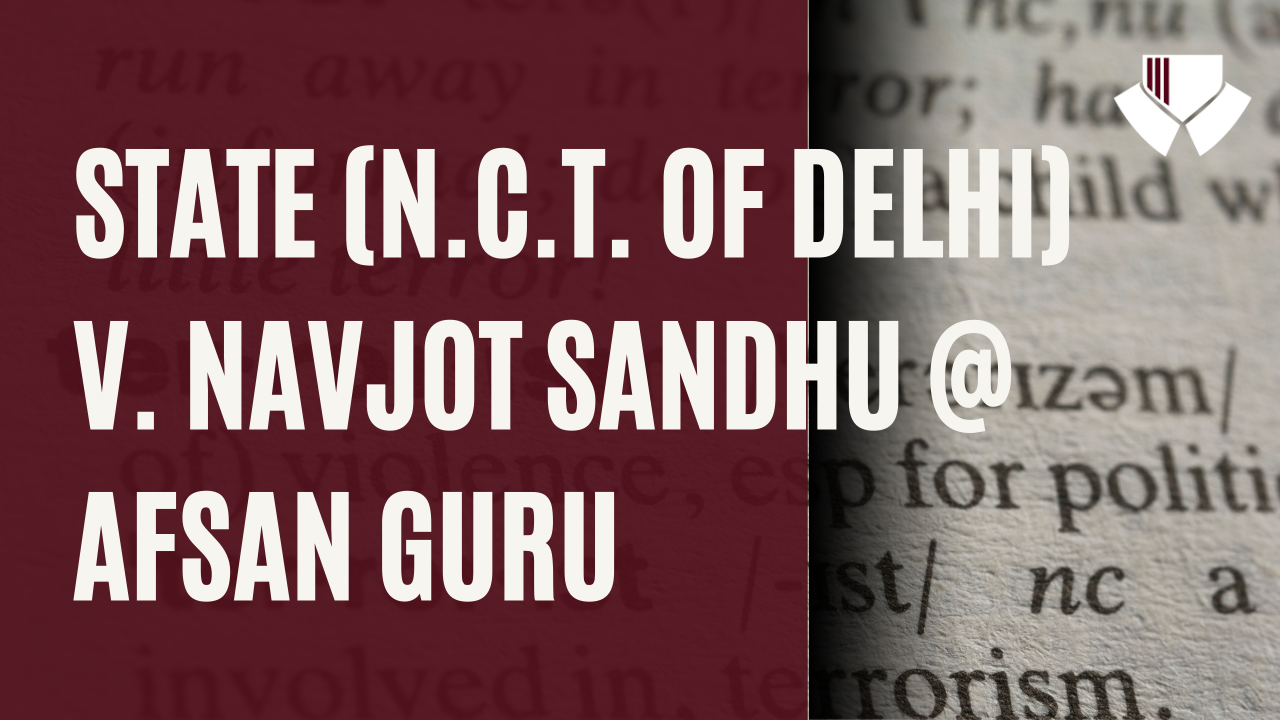This case analysis is written by Sohini Chakraborty, a 3rd year law student at Amity University, Kolkata.
CITATION: AIR 2005 SC 3820
COURT JUDGES: P. VENKATARAMA REDDI, P.P. NAOLEKAR, JJ.
BACKGROUND:
A horrific act of terrorism struck the Indian Parliament in New Delhi on December 13, 2001. A violent gunfight broke out between security officers and five terrorists who had penetrated the Parliament complex with heavy weapons. Several security guards and the five terrorists were killed in the attack. The security of the Indian Parliament was seriously questioned in the wake of this occurrence, which shocked the entire country. The student Navjot Sandhu, Afsan Guru, was accused of giving the terrorists logistical support. She was the wife of one of the accused in the case, Shaukat Hussain Guru. According to the allegations, she went to Delhi with one of the attackers, Muhammad, and bought the car used in the assault.
The trial that followed Afsan Guru’s detention turned into a contentious affair. In defense of herself, it was claimed that she had been tricked and forced into helping the terrorists and had no idea what they intended. In light of the claims of compulsion and ignorance, the case brought up significant ethical and legal concerns regarding the degree of a person’s involvement in a terrorist act. Afsan Guru was sentenced to hard labor after the trial court found her guilty. Nonetheless, there were requests for clemency and inquiries over due process and fair trial standards as the case remained a topic of discussion and controversy.
Because of its connection to a well-publicized terrorist attack and the intricate legal and moral issues it raised about the degree of a person’s involvement in such acts as well as the administration of justice in such cases, the “State (N.C.T. of Delhi) vs. Navjot Sandhu @ Afsan Guru” case continues to be a noteworthy and hotly contested legal landmark in recent Indian history.
ISSUES:
- One of the main points of contention brought up by the accused was the inadmissibility of the electronic records (cell phone call logs) that the prosecution had submitted for review in the appeal. The accused’s attorney also questioned the prosecution’s credibility and reliance on the phone records.
- The lack of a certificate from the prosecution, which is required in order to admit any electronic record under Section 65B(4) of the Evidence Act, renders the records untrustworthy.
- The case of Afsan Guru made criminal culpability a topic of discussion. It came down to figuring out how much she was involved, whether she was willing to take part, or if the terrorists were manipulating, coercing, or uninformed of her intentions.
- There was a lot of public opinion and debate around the case. While some people and organizations supported her release, pointing out possible injustices and the need for mercy, others saw her as a threat to national security.
- When used against both the maker and the co-accused, corroboration has a general nature, unless the court determines that it should be based on the specific facts of that case. Each case has unique facts, making it impossible to adopt and apply a generalized idea or proposition in every situation. The current situation’s confessions against the creator and the co-accused are so general that it does not give the court flawless justification to base the conviction in the proper case on the co-accused’s confession alone, not even with broad corroboration.
- The controversy over the death penalty in India and its appropriate use was highlighted by Afsan Guru’s sentence, which was eventually commuted to life in prison.
CONTENTIONS OF THE PETITIONER:
- Afsan Guru was an active participant in the plot to carry out the terrorist attack on the Indian Parliament, according to the petitioner, not a passive bystander.
- The petitioner claimed that Afsan Guru intentionally gave the terrorists who carried out the attack support and logistical assistance. It was claimed that she had encouraged and abetted acts of terror by buying the car and helping the terrorists get to the Parliament complex.
- The petitioner supported their claims with testimony and other proof, such as witness statements. Evidence of Afsan Guru’s involvement was provided by witness testimony and other materials.
- The seriousness of the crime and the danger it posed to national security were stressed by the prosecution. It made the case that individuals responsible for acts of terrorism needed to hear a strong message.
CONTENTIONS OF THE RESPONDENT:
- Afsan Guru argued that the terrorists had tricked and intimidated her into helping them and that she had no idea what their goals were.
- Throughout the trial, Afsan Guru voiced questions about the quality of her legal counsel. She said that her attorney did not provide her with a sufficient defense and was unable to successfully explain her case.
- The relevance of Afsan Guru’s human rights and right to a fair trial was highlighted by her defense team. Her rights, particularly the right to a fair and impartial trial, had been infringed upon, according to the defense.
- Following her conviction, Afsan Guru and her allies requested clemency, claiming that there were serious questions presented by her case regarding her degree of understanding and engagement. They claimed it was appropriate to commute her death sentence to a less severe penalty in light of these uncertainties.
JUDGEMENTS:
S.A.R. Gilani, Mohd. Afzal and Shaukat Hussain Guru were found guilty of the charges brought against them under the Explosive Substance Act, POTA, and IPC. Afzal and Shaukat Hussain, the first and second accused, were likewise found guilty in accordance with POTA Sections 3 and 4. Except for Section 123 IPC, which states, “Concealing with intent to facilitate design to wage war,” Accused No. 4, Navjot Sandhu (Afsan Guru), was found not guilty of all the other accusations. This meant that she would have to pay a fine and serve a five-year sentence of rigorous imprisonment.
For their crimes, the other three suspects received death sentences under Section 302 (murder), read in conjunction with Section 120-B IPC (party to criminal conspiracy) and Section 3(2) of POTA. According to Section 6 of the POTA, the sum of Rs. 10 lakhs was found to be missing from the possession of Mohd. Afzal and Shaukat Hussain, two of the accused, were forfeited to the State.
The verdict’s commuting of Afsan Guru’s death sentence to life in prison was its most important feature. This ruling took into account the uncertainty and complexity surrounding her role in the attack on the Parliament in 2001 as well as her request for mercy.
The Supreme Court of India heard an appeal of the case and carefully considered the arguments and supporting documentation. Although it upheld the life sentence, the Supreme Court upheld her conviction. Her limited awareness and participation in the scheme were taken into consideration by the Supreme Court in its conclusion.
CONCLUSION:
The case first and foremost emphasizes how crucial fair trial standards are, especially in well-known and highly charged instances. It appears that there were uncertainties over Afsan Guru’s level of awareness and participation in the conspiracy, as her death sentence was commuted to life in prison. This ruling emphasizes how important it is to have a judicial system that carefully considers all available information and guarantees that everyone is given a fair trial, especially in terrorist cases.
The case also brings up the continuous discussion about the death penalty’s application in India. The Supreme Court demonstrates caution when it comes to the final, irrevocable punishment of death in this case by deciding to commute the death sentence. The significance of periodically reassessing whether the death sentence is still acceptable in a society that respects human rights and the right to life is brought home by this case.


